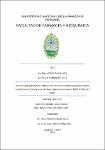Actividad antibacteriana in vitro de Geranium ayavacense sobre escherichia coli, enterococcus faecalis y staphylococcus aureus, IMET - EsSalud - 2013

View/
Date
2014Author
Ríos Gómez, Neiser Manuel
Dávila Valles, Rully Glider
Metadata
Show full item recordAbstract
Geranium ayavacense Willd. ex H.B.K (Pasuchaca) es utilizado como medicina natural para el tratamiento de diversas enfermedades, recientes estudios demuestran sus propiedades antidiabéticas, pero poco se ha estudiado sus demás propiedades como la antibacteriana. Razón por la cual el objetivo principal del presente trabajo es evaluar la actividad antibacteriana in vitro del extracto acuoso liofilizado Geranium ayavacense, sobre Escherichia coli, Enterococcus faecalis y Staphylococcus aureus. La actividad antibacteriana se determinó mediante la prueba de sensibilidad, utilizando la técnica de disco difusión en medio sólido. La planta entera de Geranium ayavacense, fue colectada en el distrito de Huaraz, departamento de Ancash. La misma fue disecada y pulverizada para obtener el extracto acuoso, posteriormente sometido a un proceso de liofilización. Se elaboraron discos de sensibilidad con el extracto acuoso liofilizado a concentraciones entre 100 y 900mg/ml. Los cuales fueron enfrentados a las colonias en crecimiento de Escherichia coli, Enterococcus faecalis y Staphylococcus aureus. La concentración mínima inhibitoria (CMI) se determinó por el método de macrodilución. Se realizó el análisis estadístico de los resultados obtenidos. La más alta actividad antibacteriana se obtuvo sobre el crecimiento de Staphylococcus aureus, a una concentración de 900mg/ml del extracto acuoso liofilizado de Geranium ayavacense, el cual produjo un halo de inhibición de 19mm. Todas las cepas estudiadas tuvieron cierto grado de sensibilidad al extracto acuoso liofilizado. La CMI sobre el crecimiento de Staphylococcus aureus fue de 8.00mg/ml, siendo este el menor valor obtenido respecto a las otras cepas estudiadas. Geranium ayavacense Willd. ex H.B.K (Pasuchaca) is used like natural medicine for the treatment of several diseases, recently studies demonstrate its anti-diabetes properties, but it has studied very little about its other properties like the antibacterial, which the main goal of this personal introduction is to evaluate the antibacterial activity in vitro lyophilized aqueous extract Geranium ayavacense, on Escherichia coli, Enterococcus faecalis and Staphylococcus aureus. The antibacterial activity was determined through the test the sensibility, using the technique of diffusion disk in solid state. The entire plant of Geranium ayavacense, it was collected in Huaraz district, department of Ancash. It was dissected and pulverized to obtain the aqueous extract posteriorly subjected to a process of lyophilization. The sensibility disks were elaborated with the lyophilized aqueous extract to concentrations between 100 and 900mg/ml, which they were faced to the colonies in growth of Escherichia coli, Enterococcus faecalis and Staphylococcus aureus. The minimum inhibitory concentration (CMI). It was determined for the method of macro dilution. It was made the statistical analysis of the obtained results the highest antibacterial activity is obtained about the growth of staphylococcus aureus, to a concentration of 900mg/ml of the lyophilized aqueous extract of Geranium ayavacense, which it produced a halo of inhibition of 19mm. all the studied stocks had certain degree of sensibility to lyophilized aqueous extract, the CMI about the growth of staphylococcus aureus was of 8mg/ml, this was the less value obtained with respect to the other studied stocks.
Collections
- Tesis [299]
The following license files are associated with this item:

